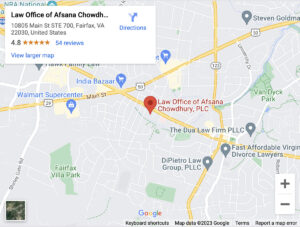
Child custody is one of the most contentious issues in a divorce case. Parents might believe they know what is best for their children, but the courts will decide for them. Our Fairfax child custody lawyers at The Chowdhury Divorce Law Group will handle this matter, so contact us at (703) 271-6519.
We offer sound legal advice and compassionate counsel as you go through the emotional and complex issues related to child custody. We’ll work with you to secure the best possible outcome for you and your children.
When your children’s best interests are at stake, you need an experienced lawyer to represent you. Contact our law firm by calling us to schedule a consultation with an attorney.
How Our Fairfax Family Law Attorneys Can Help You With Your Child Custody Case

Tensions are at their highest when parents cannot agree on a parenting plan. In some cases, custody is the only matter contested in a divorce. However, many custody disputes can be resolved with the help of an attorney.
At Chowdhury Divorce Law Group, our attorneys are highly skilled negotiators. We strive to help people resolve their disputes through mediation and settlement discussions.
Our founding attorney, Afsana Chowdhury, is nationally recognized as a top-rated attorney by The National Academy of Family Law Attorneys and the American Institute of Family Law Attorneys. She has a perfect 10 rating with Avvo.
When you hire our award-winning family lawyers, you can trust us to:
- Listen to your concerns and goals
- Develop a strategy for achieving the outcome you desire
- Explain the Virginia child custody laws that apply to your case
- Investigate allegations of domestic violence, abuse, and other wrongdoing
- Diligently work to protect your child’s best interests
- Address all of your questions and legal issues
- Represent you during settlement negotiations
If you have any questions, contact our Virginia family law attorneys at Chowdhury Divorce Law Group. We understand you are going through a challenging time. We want to help you get through it so you and your children can move forward.
How Is Child Custody Determined in Virginia?

Virginia child custody laws require judges to give primary consideration to the best interests of the child when making decisions. Virginia Code §20-124.3 provides the factors the court must consider when determining the child’s best interests.
Those factors include:
- The age of the children
- The mental and physical condition of each child
- The existing relationship between each child and each parent
- The child’s needs, including relationships that are important to the child, such as siblings, peers, and extended family members
- The roles of each parent in the care and upbringing of the child in the past and going forward
- The inclination of each party to actively support the child’s relationship and contact with the other parent
- The demonstrated ability and willingness of each parent to continue a close relationship with their children
- The ability of each parent to cooperate when resolving disputes regarding matters involving the children
- A child’s reasonable preference for custody
- History of sexual abuse, family abuse, acts of violence, or child abuse
Judges consider other factors they deem relevant to determining the child’s best interest. Parents are encouraged to develop parenting plans and time-sharing agreements that are in the best interests of their children. Even when parents submit a proposed child custody agreement, a judge reviews the terms to ensure the agreement is in the child’s best interest.
How Can I Win a Fairfax Child Custody Case?
Your first step should be meeting with an experienced attorney. Understanding your parental rights and the options available to you under Virginia’s child custody laws is crucial.
Key factors to keep in mind include:
- Do not discuss the custody case or divorce with or in front of your children.
- Remain active in your child’s life by attending games, school functions, and other important events.
- Answer a child investigator’s questions honestly and without exaggeration.
- Attend all court hearings.
- Follow instructions given to you by the family court judge.
- Abide by temporary child custody orders.
- Demonstrate your willingness to cooperate and compromise to serve your child’s best interests.
Two crucial things to always remember: Be completely honest with your attorney and follow their instructions. Working with your attorney is the best way to build a solid case to support your position regarding custody matters.
What Types of Child Custody Does Virginia Recognize?
Virginia custody laws recognize two types of custody: physical and legal.
Physical Custody in Virginia
Typically, a child lives with one parent most of the time. The parent with primary care of the child is the custodial parent.
This type is referred to as physical custody. The custodial parent has the right to make decisions regarding the day-to-day care and activities of the child. Even though the parents might share joint physical custody, it is usually better for a child to maintain a primary physical address for continuity and security.
The non-custodial parent has visitation rights. Visitation is referred to as parenting time. The parents develop or the court orders a time-sharing plan that allows the non-custodial parent to spend time with the child.
The courts recognize that children benefit from spending ample time with each parent – unless a parent is unfit. Therefore, the courts encourage time-sharing plans that give the child as much time with each parent as possible.
Legal Custody in Virginia
Legal custody is different. It refers to the right to make decisions that affect the child’s welfare. For example, a parent with legal custody can make decisions for the child regarding their education, medical treatment, religious upbringing, association with friends, and extracurricular activities.
The court may grant sole legal or joint legal custody. Courts usually prefer joint legal custody if the parents demonstrate the ability to cooperate and do what is in their children’s best interest.
Can a Child Custody Order Be Modified?

Over a child’s minor life, circumstances are bound to change. The child may join sports teams or participate in other activities. School requirements change, as do social engagements.
Likewise, a parent’s situation will likely change before their child is emancipated. These changes could impact custody arrangements. If so, the parent can petition the court to modify custody and/or visitation rights.
However, the court does not modify child custody orders without good cause. The petitioning parent must prove that a material change in circumstances justifies modifying it. Furthermore, the change in custody arrangements must be in the child’s best interest.
Circumstances that could justify modifying an order include:
- A parent has to relocate
- Changes in the parent’s life, such as a divorce, marriage, or birth of another child
- A change in the child’s medical, educational, or other needs
- A parent becomes addicted to alcohol and/or drugs
- A change in the parent’s work schedule or employment situation that impacts the child
- Changes in a parent’s financial situation
- A change in the parent’s physical and mental health
- Allegations of domestic violence or abuse
Anything that negatively impacts a child’s well-being is usually considered a material change in circumstances. How the change impacts the custody order depends on the judge’s ruling.
If parents agree to change a custody order, they can present a proposed agreement for the court’s consideration. However, disputes regarding modifications of orders require a hearing. After listening to each party’s evidence, the judge decides whether to change custody.
What Is the Role of a Guardian ad Litem in a Child Custody Case?

The court may appoint a Guardian ad Litem (GAL) in child custody cases. The GAL is an attorney who represents the child’s interests.
Judges do not investigate each case before them. Instead, they hear the evidence presented in court and decide issues based on the evidence and the law.
GALs conduct interviews and investigate custody matters to understand what would be in a child’s best interest. The law requires GALs to vigorously represent a child by protecting the child’s welfare and interests.
GALs can significantly impact the outcome of a case.
Therefore, things to keep in mind when dealing with Guardians ad Litem cases include:
- Do not lie to a GAL or exaggerate the truth
- Do not become defensive during the GAL’s investigation
- Be flexible and cooperate with the GAL to provide access to your home and information
- Never be confrontational with a GAL
- Come to meetings with the Guardian ad Litem prepared to provide requested information and documentation
- Be respectful of the GAL’s role in your child custody case
- Do not coach your child in what to say to a GAL
The Guardian ad Litem reports its findings and recommendations for custody to the court. GALs can report issues and information that parties do not raise. Even though the court gives weight to the GAL’s report, the GAL is not a judge and does not have the final say in these matters.
Schedule an Initial Consultation With Our Fairfax Child Custody Lawyers

Nothing is more important than protecting your children. Our legal team at The Chowdhury Divorce Law Group has you and your children’s best interests as our top priority. Call us at (703) 271-6519 to schedule a consultation with our Fairfax child custody attorneys.
Client Testimonial

Read more of our Google Reviews.
Additional Resources
- Custody, Visitation, and Support – Virginia Judicial System
- Virginia Child Custody Overview – Custody X Change
- Basic Information on Custody in Virginia – WomensLaw.org
*Disclaimer – we do not endorse these companies or profit from having them listed on


